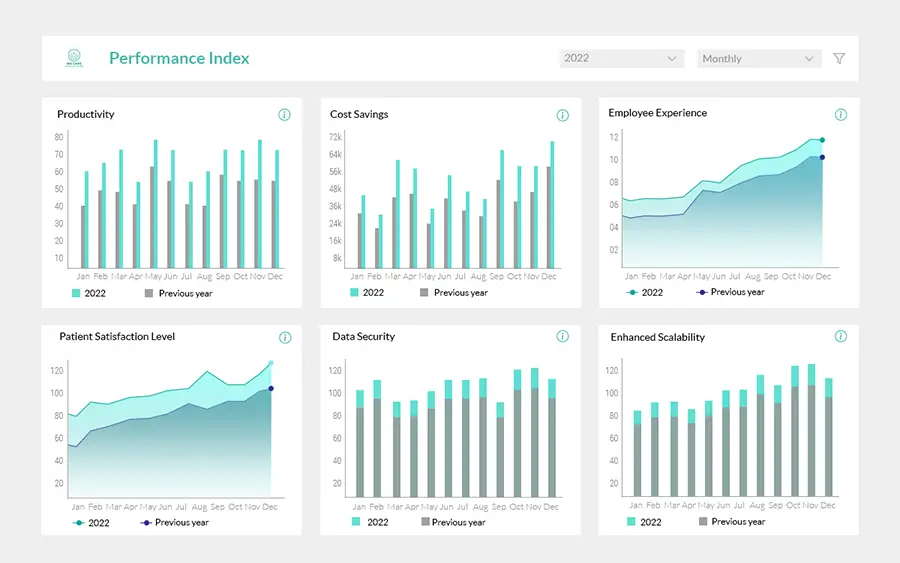Customer Background
The healthcare organization is a reputable and well-established institution in the United States of America. They serve a vast patient community with cutting-edge medical facilities and a team of over 500 dedicated healthcare professionals. Their strong commitment to delivering exceptional patient care and medical services has earned them a trusted reputation in the industry. With their state-of-the-art facilities and highly skilled healthcare professionals, they are recognized as a reputable institution.
-
Industry
Healthcare
-
Technologies / Platforms / Frameworks
Microsoft 365, Microsoft Azure, SharePoint and Power Platform
Challenges
The client encountered significant challenges due to their substantial volume of data and reliance on an outdated electronic health records (EHR) system. The specific issues they faced included:
- Performance issues: The outdated EHR system was not able to handle the large volume of data efficiently, resulting in slow response times and delayed access to critical patient information.
- Data security vulnerabilities: The obsolete system had security weaknesses, making patient data susceptible to unauthorized access and potential breaches, raising concerns about patient privacy and compliance with data protection regulations.
- Limited collaboration: The lack of modern collaboration features made it difficult for healthcare professionals to efficiently share and access patient records, leading to communication gaps and potential errors in patient care.
- Compliance concerns: The traditional EHR system did not meet the latest industry regulations and standards, posing a risk of non-compliance and potential legal repercussions.
- Scalability limitations: With the ever-growing volume of data, the existing system was not able to scale effectively, hindering the ability to accommodate increasing data demands and organizational growth.
- Poor user experience: The user interface and overall user experience of the outdated EHR system were subpar, leading to frustration among healthcare professionals and impacting productivity.
The cumulative effect of these challenges hindered efficient patient care, decision-making and regulatory adherence.
Solutions
Our team engaged in extensive discussions with their team to gain a proper understanding of systems and conducted a thorough analysis of all their processes. After careful evaluation, our team chose Microsoft 365 as the ideal platform due to its robust features, security, scalability and compatibility with healthcare regulations.
- Cloud migration: By migrating to Microsoft Azure, the organization gained access to a secure and scalable cloud storage platform. This allowed them to store and manage vast amounts of patient data efficiently while ensuring accessibility and reliability for authorized personnel.
- Custom workflows and automations: We utilized Microsoft 365’s Power Platform to create custom workflows and automations to streamline administrative processes. This included automating appointment scheduling, billing, and other routine tasks, reducing manual errors and saving time for healthcare staff.
- Integration with existing systems: Integration with existing hospital systems, such as laboratory systems and radiology information systems, was accomplished to ensure a seamless flow of data and avoid information silos.
- Data backup and disaster recovery: Robust data backup and disaster recovery mechanisms were put in place using Microsoft 365’s built-in features to ensure the organization’s critical patient data was protected against any unforeseen events or data loss scenarios.
- Remote patient monitoring: Microsoft 365 can be used to enable remote patient monitoring, which allows healthcare providers to track patients’ vital signs and other health data from a distance. This can help improve patient care by allowing providers to intervene early in the course of an illness.
- Telehealth: Microsoft 365 offers several features that can be used to support telehealth, such as the ability to conduct video calls, share files and collaborate on documents. This can help organizations provide care to patients who cannot travel to a clinic or hospital.
Benefits
- Increased efficiency and productivity: Migrating to Microsoft 365 streamlined admin tasks with custom workflows, reducing errors and saving time. This increased healthcare professionals’ focus on patient care, boosting overall efficiency and productivity.
- Scalability and cost savings: With Microsoft Azure’s cloud-based storage, the organization scaled data storage dynamically, saving hardware costs and adapting to changing data demands and growth.
- Improved user experience and adoption: Microsoft 365’s user-friendly interface and familiar applications eased the access of EHR for healthcare professionals. Comprehensive training and support helped staff quickly embrace the platform, minimizing change resistance.
- Enhanced patient care: Improved data access, streamlined workflows, and efficient collaboration enabled healthcare professionals to deliver better patient care, leading to improved health outcomes.

Need more information?
Tell us what you are looking for and we will get back to you right away!


